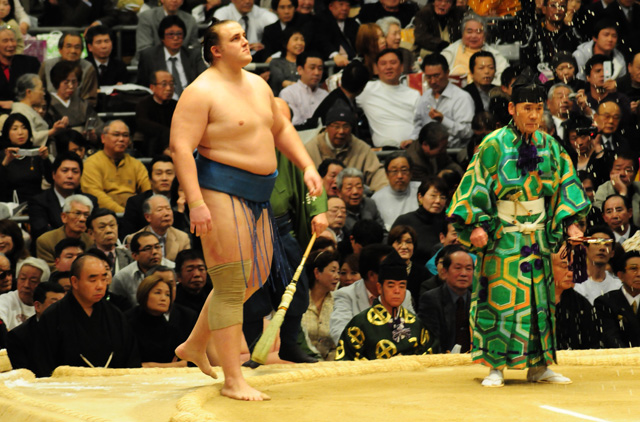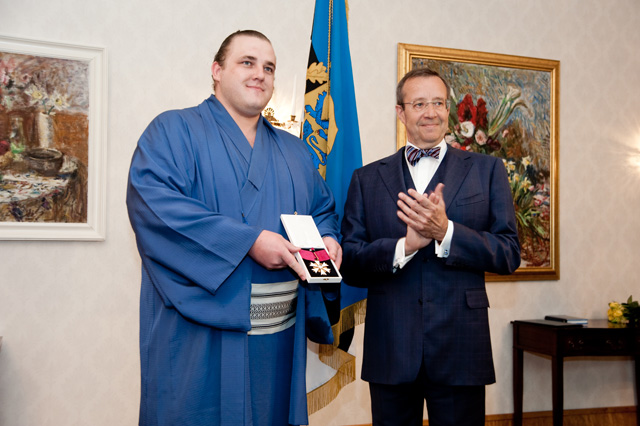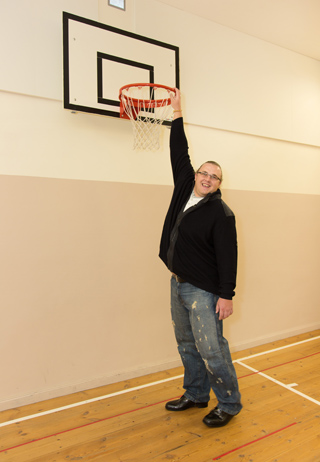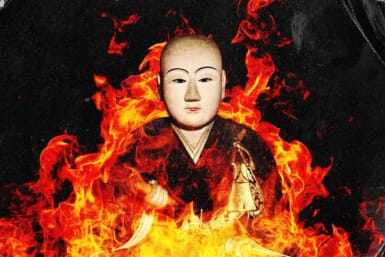Kaido Höövelson, aka Baruto, shrugs when asked about the legacy he has left behind, saying that some might see him as “just a fat sportsman.” Well, he was a lot more than that. One of the best and most colorful sumo wrestlers of his generation, his retirement leaves a huge void in the sport.
By Matthew Hernon
A persistent knee injury forced the giant Estonian to bow out at the age of just 28, yet if he is feeling sorry for himself he certainly didn’t show it when we met up for some drinks and yakiniku at a restaurant where a former teammate works in Ikegami. The 193-kg. star was in high spirits as he reflected on what has been a short, but memorable career.
“I remember my coach telling me sumo would be easy,” Baruto says with a smile. “He lied! I was doing judo at the time and he convinced me to try this Japanese sport where I would eat and sleep lots, while practicing just a little. He was right about the first two things, but not about the last one.
The training was long and hard. I’d wake up around 5 am, go to the club and stay there until 11 am. I guess it was kind of like school: you think it’s really tough at the time, but looking back you realize it was fun.”
“DiCaprio looks like me, I don’t look like him … He sent me a text message telling me how honored he was by the comparison.”
For some youngsters the pressure and intensity of training proves too much and they end up running away, and in some stables, tough training crosses the line. The world of sumo faced one of its biggest scandals in 2007 when 17-year-old Takashi Saito died after being beaten with a metal baseball bat and a beer bottle at the stable where he was training.
Whilst Baruto’s stable master was severe with him, he never experienced anything like that and never felt that things went too far. A former bouncer who grew up on a cattle farm, he also disagrees with the notion that today’s young pupils of the sport are being pushed to the limit by their trainers.
“I think they should do even more,” he tells Weekender. “Shiraishi, who works at this yakiniku restaurant, and I used to do double sessions, in the morning and evening. That was our own choice because we wanted to get stronger. Additionally, being a foreigner in what is quite an enclosed nation, I had to work even harder to prove myself.”
Baruto’s fierce determination soon started to yield results. He made the top division in just two years, the second fastest rise in the history of sumo. He was then promoted to ōzeki rank in 2010, beating Hakuhō— the man he considers by far his toughest opponent ever—along the way. Two years later he recorded his first and only championship victory.
With sumo being dominated by stories of drug-taking, match-fixing and brawls, the rise of the 6’6” Estonian provided the sport with a real boost during its darkest days. Despite many supporters growing tired of continuing foreign dominance in sumo, they seemed to take to Baruto. An affable guy who always had a smile on his face, he was considered the glamour boy of the sumo world and was even compared to Leonardo DiCaprio.
“DiCaprio looks like me, I don’t look like him,” he says while laughing. “He sent me a text message telling me how honoured he was by the comparison.”
Baruto is clearly someone who doesn’t take life too seriously; he loves joking around and has a good-sized sense of irony. During our meal, a young lady comes up to ask for a photo. With a deadpan expression, he agrees and offers to take her picture. After a few seconds of confusion she realizes he isn’t being serious.
The fact that he is so approachable and is able to have a laugh with his fans is one of the main reasons why his popularity soared during the last few years of his career. He trained arduously to achieve the success he did and therefore wanted to enjoy it. It’s just a shame that he couldn’t earn that promotion to yokozuna.
Refusing to use injuries as an excuse, he prefers to concentrate on the positives. He believes his troublesome knee, which he had at the start of his career, actually pushed him to try even harder and without it he “may not have even reached ōzeki status,” (the rank directly below yokozuna). He has no regrets about his time in sumo as he prepares for a new life away from the sport.
“I loved wrestling and I will miss it,” he tells us. “Especially going out drinking with teammates from the stable! That said, I’ve spent much of the past ten years fighting for other people. I’m looking forward to being able to do things for myself. Elena (Tregubova) and I are already married, but we will have the wedding ceremony in Estonia in June, then there is our little motel and our big farm to keep us busy. I would also like to do some sumo coaching in the future.”
Before any of that was his retirement ceremony at Kokugikan last weekend on February 8, which included 200 people cutting his hair, guest appearances from stars like Hakuhō, and Baruto himself fighting against kids. It was a terrific send-off for a man who has been a great servant to the sport of sumo over the last decade.
Main Image: Takato Marui (originally posted to Flickr as 把瑠都関) [CC-BY-SA-2.0], via Wikimedia Commons










